Analysis of Professional Duty: Solicitors vs. Barristers
VerifiedAdded on 2023/01/10
|7
|1714
|80
Report
AI Summary
This report provides a detailed analysis of the professional duties of solicitors and barristers within the legal system. It differentiates between the roles of solicitors, who are officers of the court and handle a wide range of legal matters including client representation and instructing barristers, and barristers, who primarily act as advocates in higher courts and provide legal advice. The report emphasizes the importance of adherence to professional codes of conduct for both, highlighting ethical obligations, the impact of disciplinary actions, and the need for integrity and confidentiality. It examines the legal obligations of solicitors as outlined in the Legal Services Act 2007, their duty to act in the best interests of their clients, and the importance of maintaining independence. The report also discusses the roles of barristers in providing legal advice, cross-examining witnesses, and ensuring that they act in the best interest of everyone. The conclusion summarizes the key differences and shared responsibilities of solicitors and barristers in upholding the integrity of the legal profession and ensuring justice.
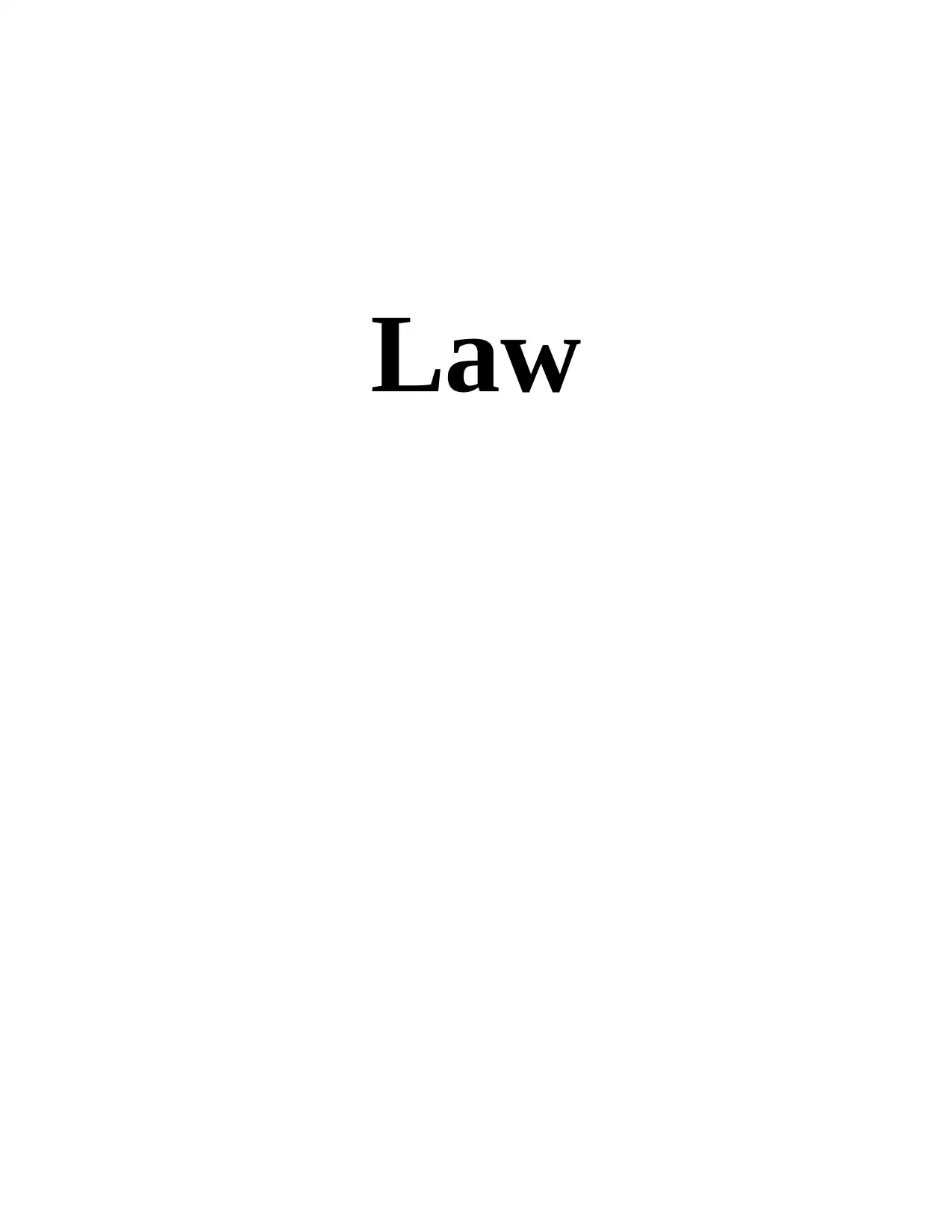
Law
Paraphrase This Document
Need a fresh take? Get an instant paraphrase of this document with our AI Paraphraser
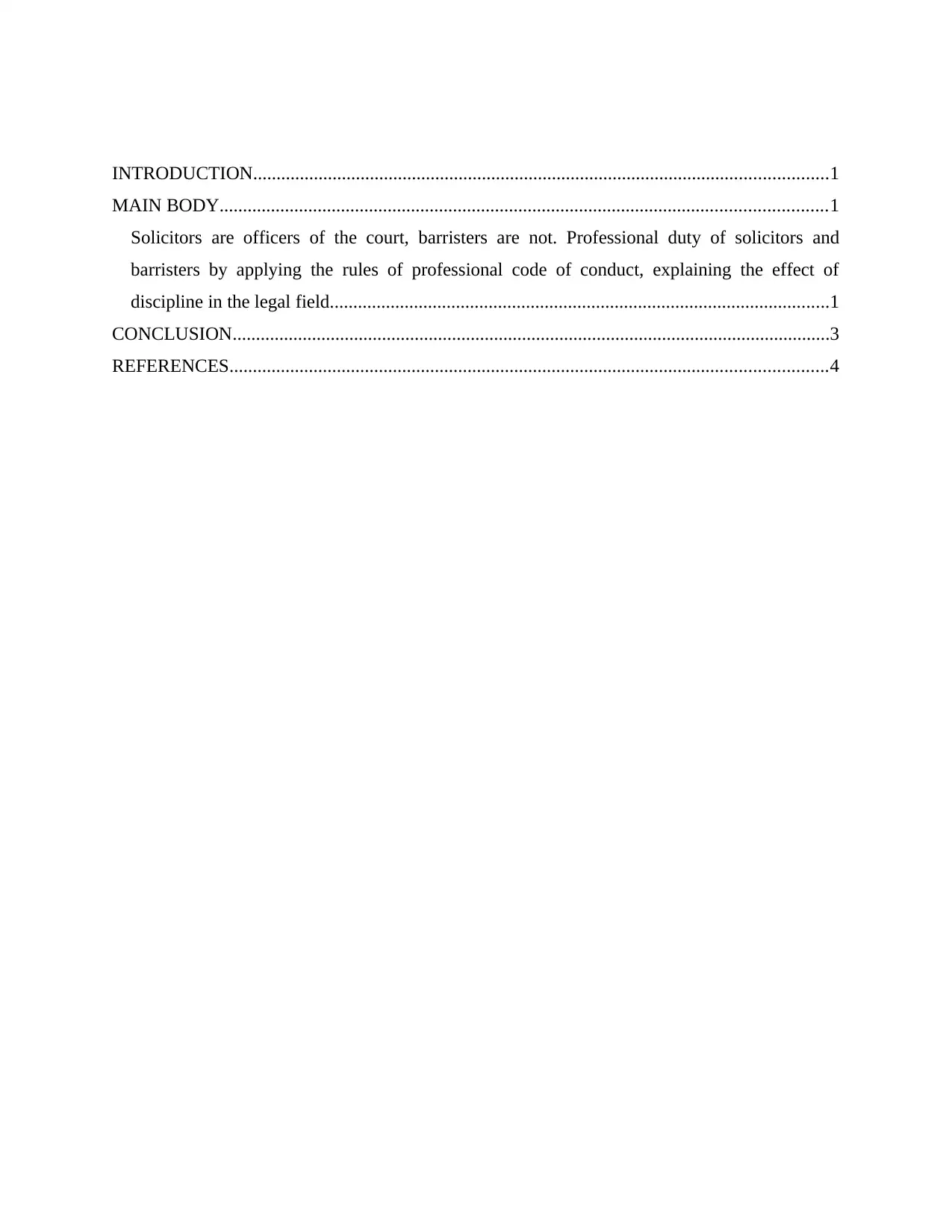
INTRODUCTION...........................................................................................................................1
MAIN BODY..................................................................................................................................1
Solicitors are officers of the court, barristers are not. Professional duty of solicitors and
barristers by applying the rules of professional code of conduct, explaining the effect of
discipline in the legal field...........................................................................................................1
CONCLUSION................................................................................................................................3
REFERENCES................................................................................................................................4
MAIN BODY..................................................................................................................................1
Solicitors are officers of the court, barristers are not. Professional duty of solicitors and
barristers by applying the rules of professional code of conduct, explaining the effect of
discipline in the legal field...........................................................................................................1
CONCLUSION................................................................................................................................3
REFERENCES................................................................................................................................4
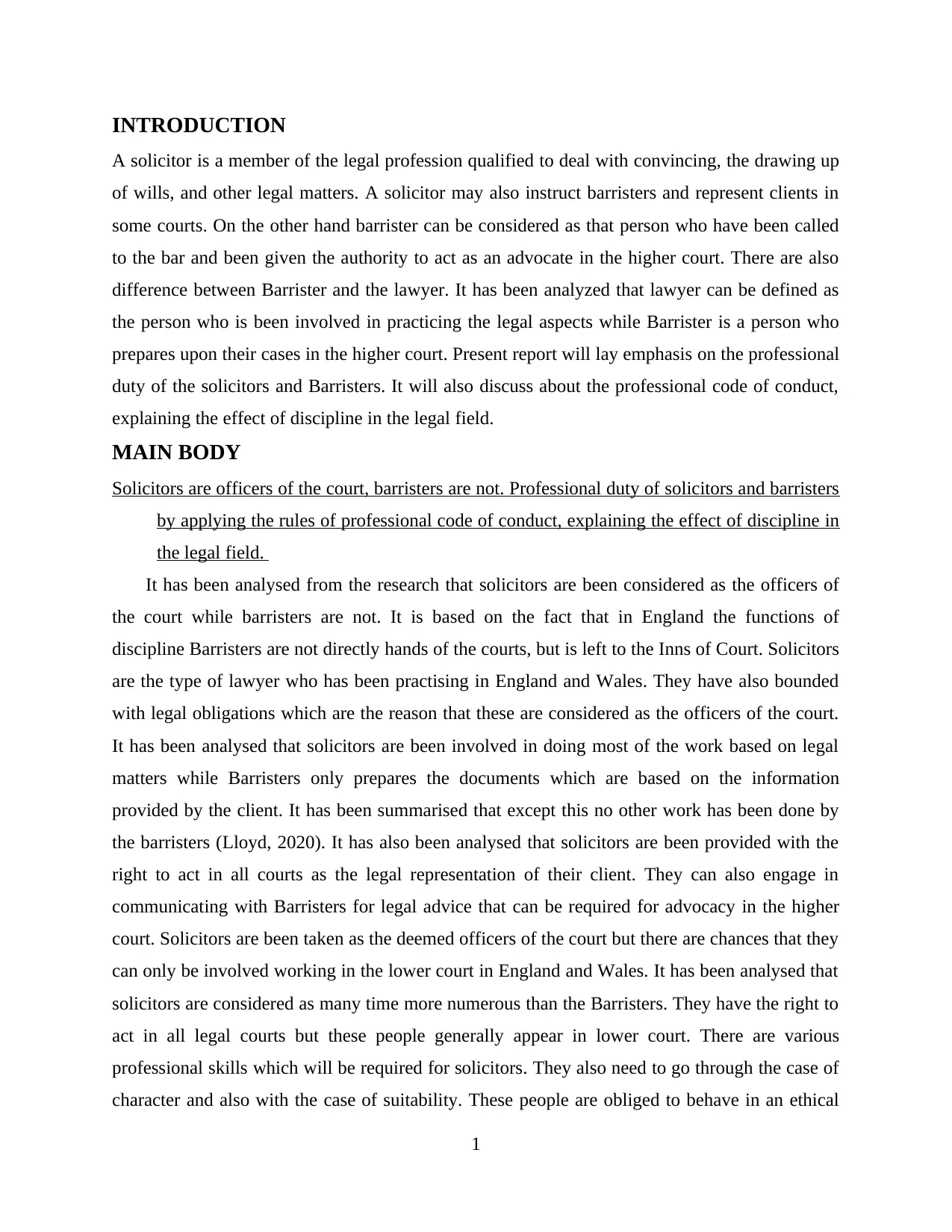
INTRODUCTION
A solicitor is a member of the legal profession qualified to deal with convincing, the drawing up
of wills, and other legal matters. A solicitor may also instruct barristers and represent clients in
some courts. On the other hand barrister can be considered as that person who have been called
to the bar and been given the authority to act as an advocate in the higher court. There are also
difference between Barrister and the lawyer. It has been analyzed that lawyer can be defined as
the person who is been involved in practicing the legal aspects while Barrister is a person who
prepares upon their cases in the higher court. Present report will lay emphasis on the professional
duty of the solicitors and Barristers. It will also discuss about the professional code of conduct,
explaining the effect of discipline in the legal field.
MAIN BODY
Solicitors are officers of the court, barristers are not. Professional duty of solicitors and barristers
by applying the rules of professional code of conduct, explaining the effect of discipline in
the legal field.
It has been analysed from the research that solicitors are been considered as the officers of
the court while barristers are not. It is based on the fact that in England the functions of
discipline Barristers are not directly hands of the courts, but is left to the Inns of Court. Solicitors
are the type of lawyer who has been practising in England and Wales. They have also bounded
with legal obligations which are the reason that these are considered as the officers of the court.
It has been analysed that solicitors are been involved in doing most of the work based on legal
matters while Barristers only prepares the documents which are based on the information
provided by the client. It has been summarised that except this no other work has been done by
the barristers (Lloyd, 2020). It has also been analysed that solicitors are been provided with the
right to act in all courts as the legal representation of their client. They can also engage in
communicating with Barristers for legal advice that can be required for advocacy in the higher
court. Solicitors are been taken as the deemed officers of the court but there are chances that they
can only be involved working in the lower court in England and Wales. It has been analysed that
solicitors are considered as many time more numerous than the Barristers. They have the right to
act in all legal courts but these people generally appear in lower court. There are various
professional skills which will be required for solicitors. They also need to go through the case of
character and also with the case of suitability. These people are obliged to behave in an ethical
1
A solicitor is a member of the legal profession qualified to deal with convincing, the drawing up
of wills, and other legal matters. A solicitor may also instruct barristers and represent clients in
some courts. On the other hand barrister can be considered as that person who have been called
to the bar and been given the authority to act as an advocate in the higher court. There are also
difference between Barrister and the lawyer. It has been analyzed that lawyer can be defined as
the person who is been involved in practicing the legal aspects while Barrister is a person who
prepares upon their cases in the higher court. Present report will lay emphasis on the professional
duty of the solicitors and Barristers. It will also discuss about the professional code of conduct,
explaining the effect of discipline in the legal field.
MAIN BODY
Solicitors are officers of the court, barristers are not. Professional duty of solicitors and barristers
by applying the rules of professional code of conduct, explaining the effect of discipline in
the legal field.
It has been analysed from the research that solicitors are been considered as the officers of
the court while barristers are not. It is based on the fact that in England the functions of
discipline Barristers are not directly hands of the courts, but is left to the Inns of Court. Solicitors
are the type of lawyer who has been practising in England and Wales. They have also bounded
with legal obligations which are the reason that these are considered as the officers of the court.
It has been analysed that solicitors are been involved in doing most of the work based on legal
matters while Barristers only prepares the documents which are based on the information
provided by the client. It has been summarised that except this no other work has been done by
the barristers (Lloyd, 2020). It has also been analysed that solicitors are been provided with the
right to act in all courts as the legal representation of their client. They can also engage in
communicating with Barristers for legal advice that can be required for advocacy in the higher
court. Solicitors are been taken as the deemed officers of the court but there are chances that they
can only be involved working in the lower court in England and Wales. It has been analysed that
solicitors are considered as many time more numerous than the Barristers. They have the right to
act in all legal courts but these people generally appear in lower court. There are various
professional skills which will be required for solicitors. They also need to go through the case of
character and also with the case of suitability. These people are obliged to behave in an ethical
1
⊘ This is a preview!⊘
Do you want full access?
Subscribe today to unlock all pages.

Trusted by 1+ million students worldwide
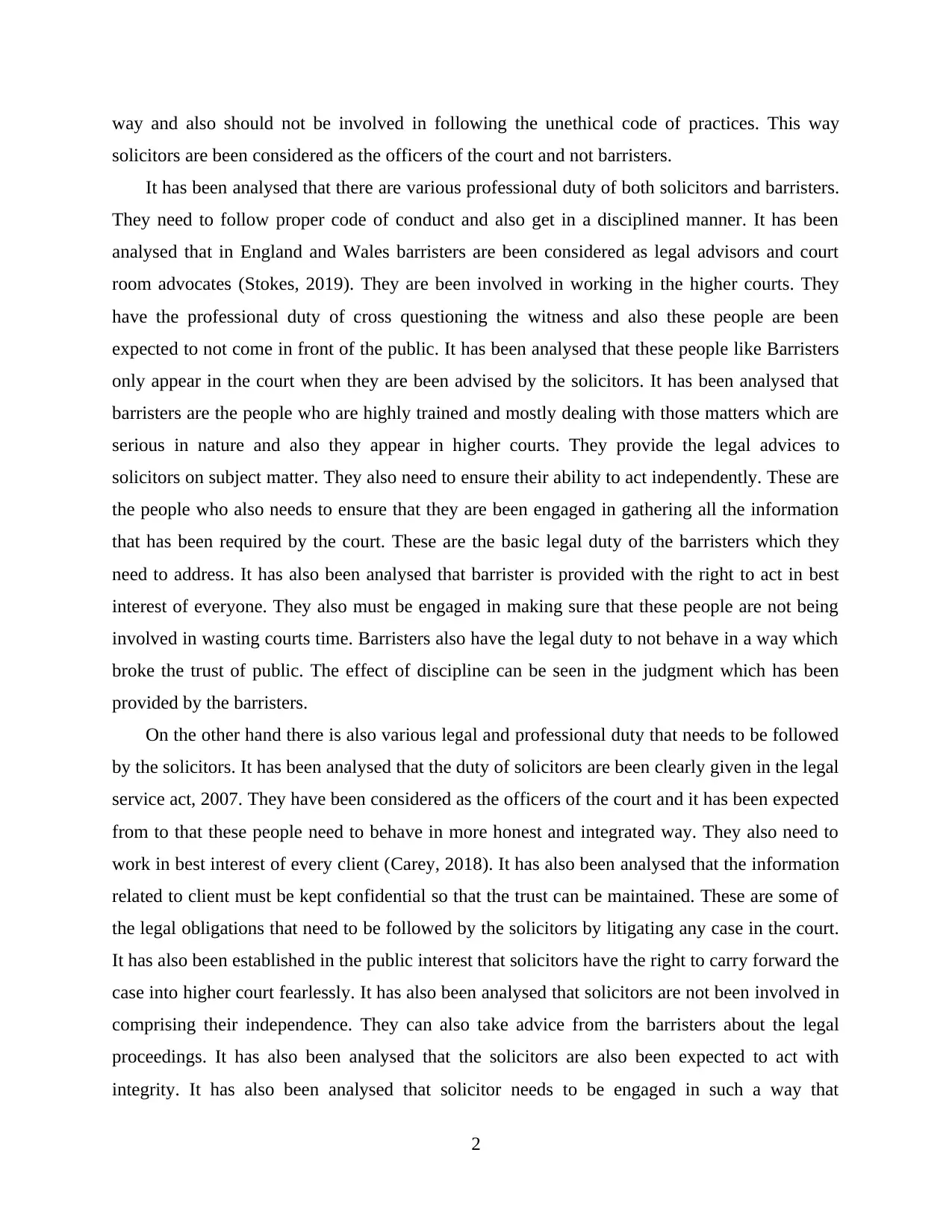
way and also should not be involved in following the unethical code of practices. This way
solicitors are been considered as the officers of the court and not barristers.
It has been analysed that there are various professional duty of both solicitors and barristers.
They need to follow proper code of conduct and also get in a disciplined manner. It has been
analysed that in England and Wales barristers are been considered as legal advisors and court
room advocates (Stokes, 2019). They are been involved in working in the higher courts. They
have the professional duty of cross questioning the witness and also these people are been
expected to not come in front of the public. It has been analysed that these people like Barristers
only appear in the court when they are been advised by the solicitors. It has been analysed that
barristers are the people who are highly trained and mostly dealing with those matters which are
serious in nature and also they appear in higher courts. They provide the legal advices to
solicitors on subject matter. They also need to ensure their ability to act independently. These are
the people who also needs to ensure that they are been engaged in gathering all the information
that has been required by the court. These are the basic legal duty of the barristers which they
need to address. It has also been analysed that barrister is provided with the right to act in best
interest of everyone. They also must be engaged in making sure that these people are not being
involved in wasting courts time. Barristers also have the legal duty to not behave in a way which
broke the trust of public. The effect of discipline can be seen in the judgment which has been
provided by the barristers.
On the other hand there is also various legal and professional duty that needs to be followed
by the solicitors. It has been analysed that the duty of solicitors are been clearly given in the legal
service act, 2007. They have been considered as the officers of the court and it has been expected
from to that these people need to behave in more honest and integrated way. They also need to
work in best interest of every client (Carey, 2018). It has also been analysed that the information
related to client must be kept confidential so that the trust can be maintained. These are some of
the legal obligations that need to be followed by the solicitors by litigating any case in the court.
It has also been established in the public interest that solicitors have the right to carry forward the
case into higher court fearlessly. It has also been analysed that solicitors are not been involved in
comprising their independence. They can also take advice from the barristers about the legal
proceedings. It has also been analysed that the solicitors are also been expected to act with
integrity. It has also been analysed that solicitor needs to be engaged in such a way that
2
solicitors are been considered as the officers of the court and not barristers.
It has been analysed that there are various professional duty of both solicitors and barristers.
They need to follow proper code of conduct and also get in a disciplined manner. It has been
analysed that in England and Wales barristers are been considered as legal advisors and court
room advocates (Stokes, 2019). They are been involved in working in the higher courts. They
have the professional duty of cross questioning the witness and also these people are been
expected to not come in front of the public. It has been analysed that these people like Barristers
only appear in the court when they are been advised by the solicitors. It has been analysed that
barristers are the people who are highly trained and mostly dealing with those matters which are
serious in nature and also they appear in higher courts. They provide the legal advices to
solicitors on subject matter. They also need to ensure their ability to act independently. These are
the people who also needs to ensure that they are been engaged in gathering all the information
that has been required by the court. These are the basic legal duty of the barristers which they
need to address. It has also been analysed that barrister is provided with the right to act in best
interest of everyone. They also must be engaged in making sure that these people are not being
involved in wasting courts time. Barristers also have the legal duty to not behave in a way which
broke the trust of public. The effect of discipline can be seen in the judgment which has been
provided by the barristers.
On the other hand there is also various legal and professional duty that needs to be followed
by the solicitors. It has been analysed that the duty of solicitors are been clearly given in the legal
service act, 2007. They have been considered as the officers of the court and it has been expected
from to that these people need to behave in more honest and integrated way. They also need to
work in best interest of every client (Carey, 2018). It has also been analysed that the information
related to client must be kept confidential so that the trust can be maintained. These are some of
the legal obligations that need to be followed by the solicitors by litigating any case in the court.
It has also been established in the public interest that solicitors have the right to carry forward the
case into higher court fearlessly. It has also been analysed that solicitors are not been involved in
comprising their independence. They can also take advice from the barristers about the legal
proceedings. It has also been analysed that the solicitors are also been expected to act with
integrity. It has also been analysed that solicitor needs to be engaged in such a way that
2
Paraphrase This Document
Need a fresh take? Get an instant paraphrase of this document with our AI Paraphraser
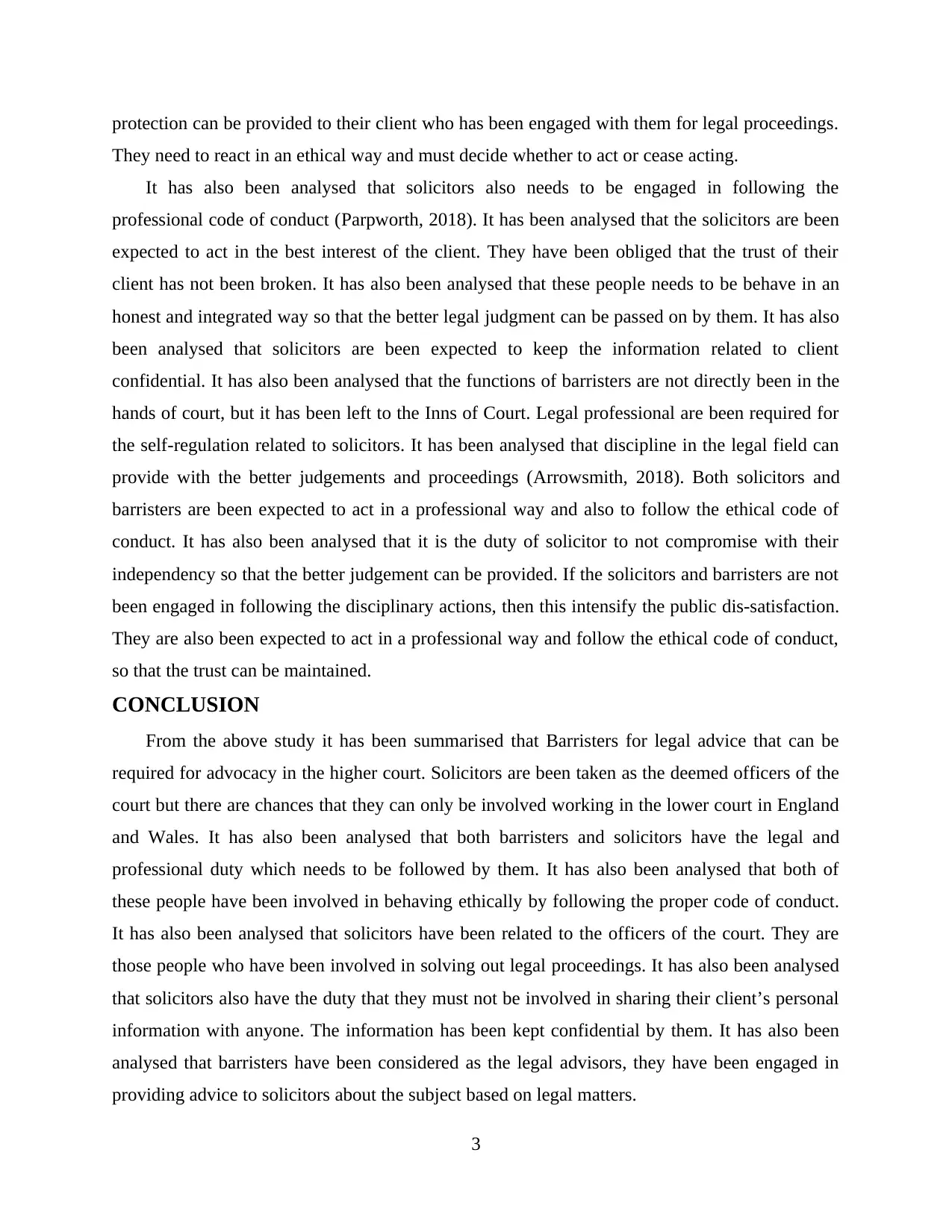
protection can be provided to their client who has been engaged with them for legal proceedings.
They need to react in an ethical way and must decide whether to act or cease acting.
It has also been analysed that solicitors also needs to be engaged in following the
professional code of conduct (Parpworth, 2018). It has been analysed that the solicitors are been
expected to act in the best interest of the client. They have been obliged that the trust of their
client has not been broken. It has also been analysed that these people needs to be behave in an
honest and integrated way so that the better legal judgment can be passed on by them. It has also
been analysed that solicitors are been expected to keep the information related to client
confidential. It has also been analysed that the functions of barristers are not directly been in the
hands of court, but it has been left to the Inns of Court. Legal professional are been required for
the self-regulation related to solicitors. It has been analysed that discipline in the legal field can
provide with the better judgements and proceedings (Arrowsmith, 2018). Both solicitors and
barristers are been expected to act in a professional way and also to follow the ethical code of
conduct. It has also been analysed that it is the duty of solicitor to not compromise with their
independency so that the better judgement can be provided. If the solicitors and barristers are not
been engaged in following the disciplinary actions, then this intensify the public dis-satisfaction.
They are also been expected to act in a professional way and follow the ethical code of conduct,
so that the trust can be maintained.
CONCLUSION
From the above study it has been summarised that Barristers for legal advice that can be
required for advocacy in the higher court. Solicitors are been taken as the deemed officers of the
court but there are chances that they can only be involved working in the lower court in England
and Wales. It has also been analysed that both barristers and solicitors have the legal and
professional duty which needs to be followed by them. It has also been analysed that both of
these people have been involved in behaving ethically by following the proper code of conduct.
It has also been analysed that solicitors have been related to the officers of the court. They are
those people who have been involved in solving out legal proceedings. It has also been analysed
that solicitors also have the duty that they must not be involved in sharing their client’s personal
information with anyone. The information has been kept confidential by them. It has also been
analysed that barristers have been considered as the legal advisors, they have been engaged in
providing advice to solicitors about the subject based on legal matters.
3
They need to react in an ethical way and must decide whether to act or cease acting.
It has also been analysed that solicitors also needs to be engaged in following the
professional code of conduct (Parpworth, 2018). It has been analysed that the solicitors are been
expected to act in the best interest of the client. They have been obliged that the trust of their
client has not been broken. It has also been analysed that these people needs to be behave in an
honest and integrated way so that the better legal judgment can be passed on by them. It has also
been analysed that solicitors are been expected to keep the information related to client
confidential. It has also been analysed that the functions of barristers are not directly been in the
hands of court, but it has been left to the Inns of Court. Legal professional are been required for
the self-regulation related to solicitors. It has been analysed that discipline in the legal field can
provide with the better judgements and proceedings (Arrowsmith, 2018). Both solicitors and
barristers are been expected to act in a professional way and also to follow the ethical code of
conduct. It has also been analysed that it is the duty of solicitor to not compromise with their
independency so that the better judgement can be provided. If the solicitors and barristers are not
been engaged in following the disciplinary actions, then this intensify the public dis-satisfaction.
They are also been expected to act in a professional way and follow the ethical code of conduct,
so that the trust can be maintained.
CONCLUSION
From the above study it has been summarised that Barristers for legal advice that can be
required for advocacy in the higher court. Solicitors are been taken as the deemed officers of the
court but there are chances that they can only be involved working in the lower court in England
and Wales. It has also been analysed that both barristers and solicitors have the legal and
professional duty which needs to be followed by them. It has also been analysed that both of
these people have been involved in behaving ethically by following the proper code of conduct.
It has also been analysed that solicitors have been related to the officers of the court. They are
those people who have been involved in solving out legal proceedings. It has also been analysed
that solicitors also have the duty that they must not be involved in sharing their client’s personal
information with anyone. The information has been kept confidential by them. It has also been
analysed that barristers have been considered as the legal advisors, they have been engaged in
providing advice to solicitors about the subject based on legal matters.
3
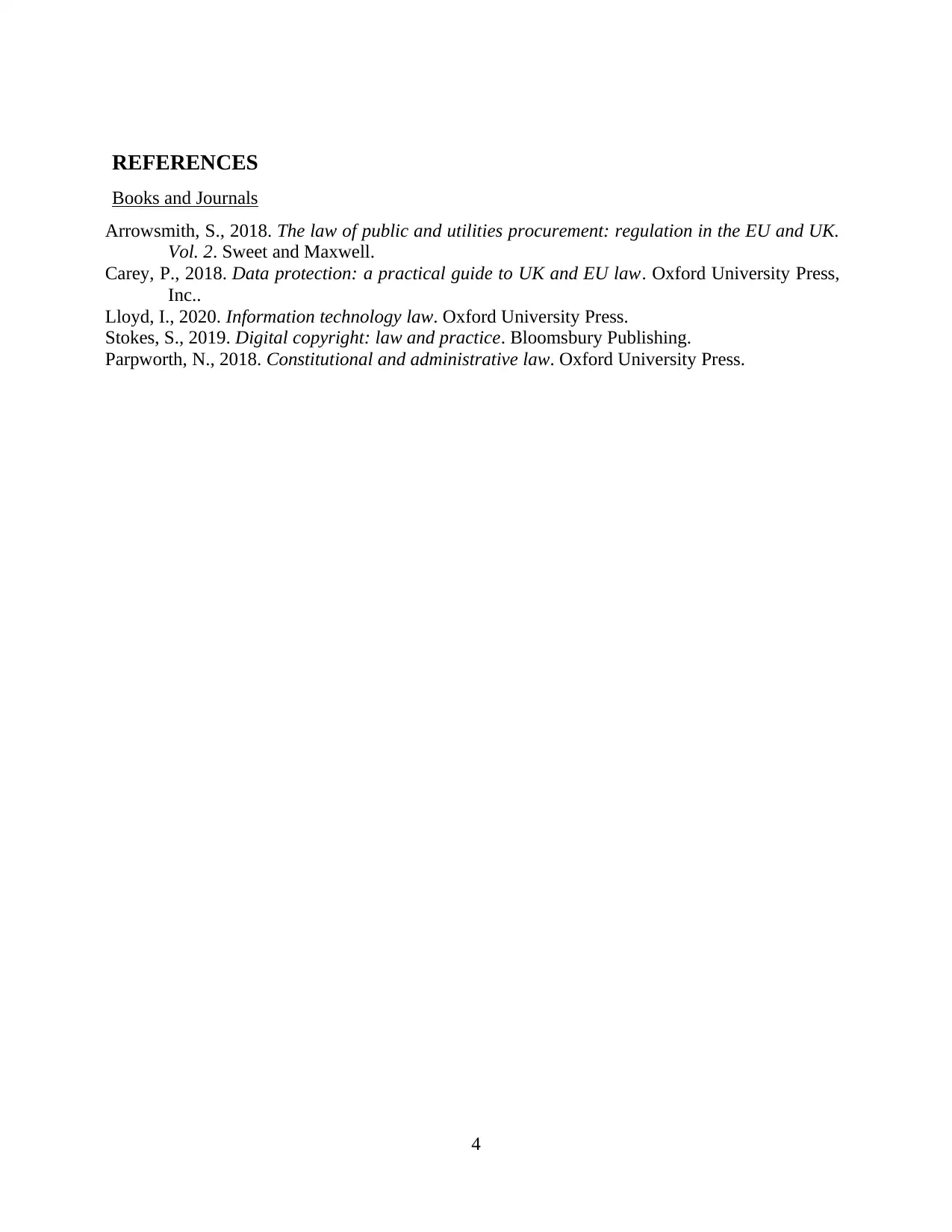
REFERENCES
Books and Journals
Arrowsmith, S., 2018. The law of public and utilities procurement: regulation in the EU and UK.
Vol. 2. Sweet and Maxwell.
Carey, P., 2018. Data protection: a practical guide to UK and EU law. Oxford University Press,
Inc..
Lloyd, I., 2020. Information technology law. Oxford University Press.
Stokes, S., 2019. Digital copyright: law and practice. Bloomsbury Publishing.
Parpworth, N., 2018. Constitutional and administrative law. Oxford University Press.
4
Books and Journals
Arrowsmith, S., 2018. The law of public and utilities procurement: regulation in the EU and UK.
Vol. 2. Sweet and Maxwell.
Carey, P., 2018. Data protection: a practical guide to UK and EU law. Oxford University Press,
Inc..
Lloyd, I., 2020. Information technology law. Oxford University Press.
Stokes, S., 2019. Digital copyright: law and practice. Bloomsbury Publishing.
Parpworth, N., 2018. Constitutional and administrative law. Oxford University Press.
4
⊘ This is a preview!⊘
Do you want full access?
Subscribe today to unlock all pages.

Trusted by 1+ million students worldwide

5
1 out of 7
Related Documents
Your All-in-One AI-Powered Toolkit for Academic Success.
+13062052269
info@desklib.com
Available 24*7 on WhatsApp / Email
![[object Object]](/_next/static/media/star-bottom.7253800d.svg)
Unlock your academic potential
Copyright © 2020–2026 A2Z Services. All Rights Reserved. Developed and managed by ZUCOL.



